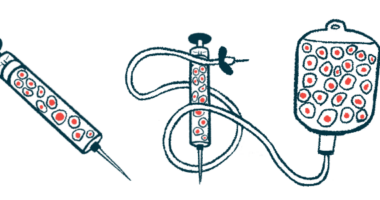How schools (too often) need to be educated about HAE
Parent advocacy is sometimes necessary to get children the care they need

“Mom?” my oldest son’s raspy and weak voice said over the phone. “Can you come pick me up? I don’t feel good.”
I had my keys in my hand before he finished the sentence. Our oldest son carries the proud badge of being the healthiest kid in the house. Although he suffered from a common childhood illness in elementary school, by the time he reached middle school, it became a common trope in our family that everyone else would get sick except for him.
Because of this, I was immediately alarmed when I heard his voice.
When I arrived at the school and rushed into the front office, I found him sitting in a chair with his head against the wall, pale, sweating, and burning with a fever. After a quick trip to the pediatrician and a confirmed 103-degree temperature, he was diagnosed with influenza B.
“You OK?” my husband asked me later that evening as I finished the email informing the school of our son’s diagnosis.
“No,” I replied. “He was obviously sick, so it’s easy to see when he needs to come home. But what will happen when Ladybug goes to middle school?”
My fears, at the time, were valid. It was 2018, and while we didn’t know what was going on with our oldest daughter, whom we lovingly call Ladybug, we knew something was wrong and that we should be worried.
By 2021, when she was officially diagnosed with hereditary angioedema (HAE), I was still worried. She was due to start junior high in the fall, and I already had some anxiety about how we’d navigate school and her illness.
Sure, HAE has visible symptoms. We were used to seeing Ladybug’s face or lips swell; that’s a telltale sign that she’s having a flare. However, other symptoms, such as gastrointestinal flares, debilitating fatigue, or the prodromes, are unseen. At the time, we were still learning how to detect these symptoms. Would the average school staff be able to detect what they couldn’t see?
The answer to this question is not as cut and dry as some think it should be. While there are exceptional teachers, administrators, staff members, and aides who are willing to learn everything they need to know about Ladybug’s illness, we do encounter occasional setbacks. Although we always have within reach a copy of an ER Toolkit, lists of helpful websites, and several letters from Ladybug’s doctor explaining everything in excruciating detail, we occasionally find ourselves in tense meetings or sending strongly worded emails to people who may misunderstand the disease’s severity.
Undoubtedly, for any caregiver of an adolescent with a rare chronic illness, some of our biggest battles are experienced outside hospital rooms, doctor’s offices, or over the phone with insurance companies. Sometimes, though, we find that some of our most challenging interactions exist within the walls of educational institutions. And we’re always grateful for educators willing to be educated.
When we advocate that every person in the school building should know what HAE is, we’re not doing it so they’ll treat Ladybug differently; we’re doing it so that with everything she faces in the average school day, the last thing she needs to worry about is fighting for her life.
But on those not-so-great days, I’m just a phone call away.
Note: Angioedema News is strictly a news and information website about the disease. It does not provide medical advice, diagnosis, or treatment. This content is not intended to be a substitute for professional medical advice, diagnosis, or treatment. Always seek the advice of your physician or other qualified health provider with any questions you may have regarding a medical condition. Never disregard professional medical advice or delay in seeking it because of something you have read on this website. The opinions expressed in this column are not those of Angioedema News or its parent company, BioNews, and are intended to spark discussion about issues pertaining to angioedema.








Comments